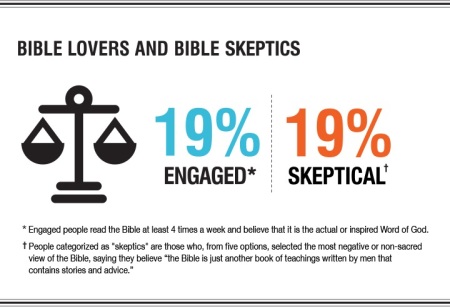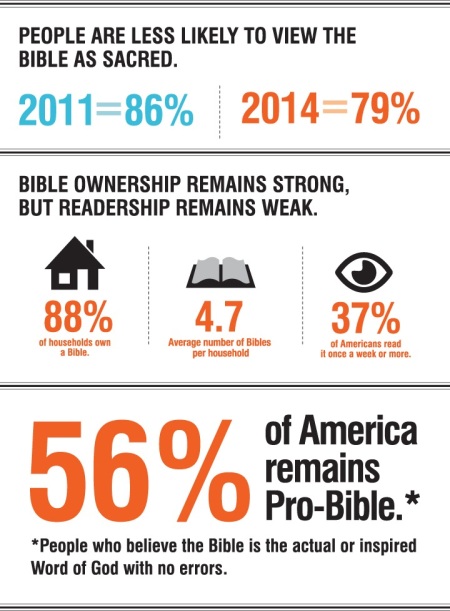State of the Bible Survey: Bible Skeptics on the Rise
The American Bible Society recently found a rise in the percentage of Americans who view the Bible skeptically, according to its Annual State of the Bible report.

Since 2011, the percentage of those who believe that the Bible is "just another book of teachings written by men that contains stories and advice" has risen from 10 percent to 19 percent of those surveyed.
The report, conducted by Barna Group, details Americans' beliefs about the Bible, its role in society, its presence in U.S. homes and other information about the best-selling book of all time.
"With four years of data from American Bible Society's State of the Bible research, we are now able to see trends in attitudes about and behaviors around the Bible," said Roy Peterson, president and CEO of American Bible Society. "The increasing polarization in attitudes about the Bible has implications for us as a nation and for our churches and families."
The new report released on Tuesday finds that the percentage of Americans who are engaged with Scripture is equal to the percentage who are skeptical — both at 19 percent. The latest findings are in American Bible Society's fourth annual State of the Bible survey.
The percentage considered "Bible-friendly" dropped from 45 percent to 37 percent, while "Bible-engaged" remained steady. The percentage of those considered neutral toward the Bible, 26 percent in 2014, has remained statistically unchanged.

As in previous years, the survey found the Bible remains a highly valued, influential force in America. But beliefs about the Bible and its role in society are becoming increasingly polarized — particularly when the data is examined by age group.
Overall, Millennials (ages 18–29) are driving the shift toward an agnostic view of the Bible. Among Millennials, the 2014 State of the Bible survey found:
Nineteen percent believe no literature is sacred (compared to 13 percent of all adults), while 64 percent believe the Bible is sacred literature (compared to 79 percent of all adults). Thirty-five percent believe the Bible contains everything a person needs to know to live a meaningful life, as compared with 50 percent for all adults.
While 50 percent of all adults believe the Bible has too little influence in society, only 30 percent of Millennials express the same belief. By way of comparison, 61 percent of Elders (those 68+) surveyed said they believe the Bible has too little influence in society.
Thirty-nine percent of Millennials never read the Bible, as compared to 26 percent of all adults.
The most common reason given for not reading the Bible more frequently among those who said their Bible reading decreased remained "busyness." The percentage of Bible readers citing busyness as their top barrier to additional Bible reading grew significantly in the last year, from 40 percent in 2013 to 47 percent in 2014.
The way Americans access the Bible is also changing, according to the State of the Bible survey results. An unprecedented 44 percent of Bible readers surveyed have accessed the Bible on a computer. Still, print versions are far from disappearing from the Bible landscape. Eighty-four percent of Bible readers surveyed said a print version of Scripture is still their primary format.
Peterson, who took the helm of American Bible Society in February, believes there is reason to hope for an upswing in Bible engagement in the future.

"American adults, young and old alike, overwhelmingly recognize a moral decline is taking place in the nation," said Peterson. "As they seek solutions, we hope they will find the Bible as the guidebook that can reverse the decline and help its readers make sense of life."
Seventy-four percent of Millennials believe morals are declining in America, while 81 percent of all adults affirm this.
American Bible Society's State of the Bible 2014 survey also found:
The Bible continues to dominate both mind space and book retail space as America's undisputed best-seller.
One in seven people reported buying a copy of the Bible in the last year.
Seventy-nine percent of Americans identify the Bible as sacred.
The Bible is readily available to nearly all Americans with an average of 4.7 Bibles per household.
More than a quarter (28 percent) of all adults read the Bible every day or several times a week, while a quarter (26 percent) never read it.
Among Bible readers, the average amount of time spent reading the Bible is 35 minutes.
One in four Bible readers (42 percent) felt peaceful after reading the Bible, three in 10 (29 percent) felt hopeful and 33 percent felt encouraged and inspired.
The King James Version is still preferred over any other translation as 34 percent of all adults read this version the most often.
Survey Methodology: The State of the Bible 2014 report contains the findings from a nationwide study commissioned by American Bible Society and conducted by Barna Research (a division of Barna Group). Two research methodologies were used for the study; one included 1,012 telephone interviews (including cellphone interviews) with adults in the continental U.S., while the second study consisted of 1,024 online surveys using a nationally representative panel. The use of two methodologies provided a larger sample size for key questions and ensured even greater representation among all age groups. The telephone interviews were conducted Jan. 8–20, 2014, and included U.S. adults 18 years of age or older. The online surveys were conducted Jan. 28–Feb. 5, 2014.





















